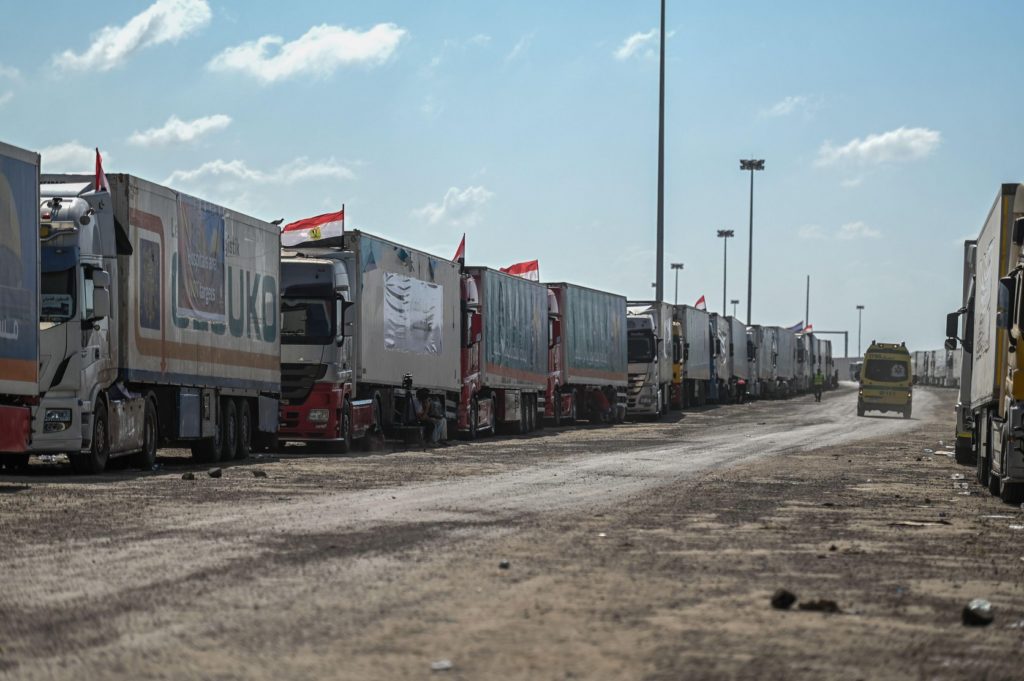IN THE MEDIA
Israel’s policy in Gaza is the opposite of the “deliberate starvation” lie
January 19, 2024 | Justin Amler

Algemeiner – 19 January 2024
It’s been over a hundred days since thousands of Hamas terrorists invaded Israel and launched an unprovoked genocidal pogrom on Israeli civilians – brutally raping, torturing and murdering more than 1,200 men, women and children in the most cruel, depraved and barbaric ways, as well as kidnapping over 240 people.
It was the darkest day for Jews in 78 years – a day in which more Jews were killed in one single day since the Holocaust ended in 1945.
Israel, as is its right and its duty, responded to the attack and took the fight to the Hamas terrorists giving meaning to the words “Never Again”.
But no sooner had Israel begun its campaign to uproot the terrorists when many actors across the world began to predictably demand Israel show restraint – even as Hamas vowed to carry out more October 7-style massacres and even as they continue to fire rockets into Israel.
Within weeks, many completely forgot about October 7, as if it somehow never happened, and began focussing exclusively on the plight of Gazan civilians – brushing aside the thousands of dead and injured and kidnapped Israelis as well as the hundreds of thousands of Israelis who remain refugees in their own country after they were forced to leave their homes due to the dangers of Hamas and Hezbollah attacks.
Israel, despite being the victim of the heinous attack, was somehow accused of being responsible for all the misery that had now befallen Gaza.
In a series of malicious lies, it was accused of deliberately targeting civilians, starving the population, denying them water and electricity, and destroying their homes.
South Africa, despite having one of the highest murder rates in the world and an increasing inability to even reliably supply electricity to its own population, still found the time and resources to effectively act as Hamas’ lawyers, dragging Israel before the International Court of Justice to answer patently absurd charges of “genocide” in Gaza.
South Africa and others who make such factually nonsensical claims insist Israel is deliberately starving the people of Gaza by denying them the “means of life.” They usually cite, as evidence, a phrase uttered by Israeli Defence Minister Yoav Gallant in the immediate aftermath of the Hamas attacks on Oct. 7, in which, describing the plans to pressure Hamas to release the hostages, Gallant said, “I have ordered a complete siege on the Gaza Strip. There will be no electricity, no food, no fuel, everything is closed.”
Yet it is self-evident that this has not been Israel’s actual policy – huge amounts of food, water and fuel have been entering Gaza, with Israel’s active assistance, over the past 100 days of war.
Between October 7 and mid-January, over 158,000 tons of humanitarian aid carried by 8621 trucks had entered the Gaza Strip – most of this food, but also many tons of medical supplies and other essentials. On Jan. 14 alone, 237 humanitarian aid trucks entered Gaza – the single largest amount since the beginning of the war.
These included tankers with cooking oil and fuel for the operation of generators for essential infrastructure services – such as hospitals, sewage treatment plants and pumping clean water.
While Israel initially cut off the water it supplied to Gaza – which only amounted to 8% of Gaza’s total consumption before the war – it began resuming such water supplies to Gaza on Oct. 15. Israel has also facilitated successful repairs of vital water infrastructure, including fixing water pipes that Hamas itself destroyed.
In addition to this, field hospitals have been set up and are expected to be operational in the coming days.
Israel has also continually implemented daily pauses in its military operations between 10:00 and 14:00 to facilitate and enable movement of humanitarian aid and allow Gazan residents to replenish their supplies of food and water.
It’s important to note that Israel has placed absolutely no upper limit on humanitarian aid entering the Gaza Strip, only requiring that all aid trucks be inspected. If there are shortages of essentials in Gaza, it is because humanitarian organizations themselves have been unable to keep up with the aid demand or are failing to distribute it effectively.
Despite the narrative being spun by many that Israel is preventing aid from entering Gaza, the real truth is the opposite. Israel, rather than targeting civilians, has done everything it can reasonably be expected to, and more, to try to help the Palestinian population while also fighting a deadly war under indescribably difficult conditions – including Hamas’ all-encompassing efforts to intertwine all of Gaza’s civilian infrastructure with its military machine.
It therefore seems truly astonishing that pressure is constantly placed on Israel to fix Gaza’s humanitarian situation, while no demands are ever made of Hamas, the actual terrorist organisation that initiated this war, continues to steal aid, uses civilians as human shields and currently holds 136 hostages – many of whom have been murdered.
The uncomfortable reality is that the world has funded Hamas’ terror state, and instead of electricity plants and desalination plants and educational institutions and engineering schools, the money and materials received were used to build at over 500kms of underground tunnels and command structures under hospitals, and establish an armoury of thousands and thousands of military weapons and rockets that were used for terror attacks.
How could all that aid be so blatantly abused? It’s a question that the world should demand answers to from Hamas, not Israel.
Perhaps the Hamas billionaire leaders sitting in luxury hotels in Qatar might be able to answer it.





